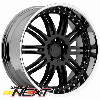Interesting read, thanks for posting.
I recently came across the following information about police use of synthetic/extended OCI:
Duluth, MN, Police Department Demonstration; 4 Police squad cars, 6 months duration, 34,600 miles on the average, equipped with AMSOIL 10W-40 Engine Oil, AMSOIL Full-Depth Oil Filters, AMSOIL BY-Pass Oil Filter, AMSOIL Lifetime Air Filter.Material and maintenance cost for the 4 units with conventional lubricants and filters was $1,052.11. With AMSOIL Lubricants and Filters, the total was only $638.20 - nearly 40% saved per mile!AMSOIL saves in labor and material costs because it can be used many thousands of miles longer than conventional lubes.
And here is another ...
http://www.synthetic-motor-oil-chan...tomers_cars/hondo_police_department_texas.php
The City of Troy, Michigan has switched its entire Police and City Hall Fleet (approximately 350 vehicles) to AMSOIL Synthetic Lubricants.
History: In the past, all marked and unmarked police vehicles would come in monthly for an oil change, lube and safety check. As a test, we switched two marked Chevrolet Caprice vehicles over to 100% synthetic AMSOIL engine oil and extended the drain intervals to 20,000 miles, with a new oil filter installed at 10,000 miles. The vehicles were still scheduled to come in monthly for a safety inspection (tires, brakes, suspension, lights, etc...), but the oil is not drained, only a sample is taken. When the two test vehicles reached 70,000 miles, the City of Troy technicians removed the oil pans and also removed the main and rod bearings to check for wear using the plastic gauge test. The bearings showed very little wear. the same procedure was performed on two marked cars, same year, make and model, using petroleum oil. The wear on the two vehicles with petroleum oil, changed monthly at about 2,500-3,000 miles, showed slightly more wear in the plastic guage test. The results were well within specifications in both cases.
Currently the city is using all Ford Crown Victorias in its police fleet. With the help of oil analysis, we were able to extend our oil changes to 18,000-20,000 miles with a new filter installed at 9,000-10,000 miles. We are currently using AMSOIL synthetic engine, transmission, and rear differential oil in all vehicles serviced out of the city hall facility.
SAVINGS: Savings have been noticed due to the decrease in number of oil filters and quarts of oil purchased and disposed of . Labor time to complete a preventative maintenance (A or B) on a vehicle has been reduced, allowing up to 50% more vehicles to be serviced each day. To date, we have not had to re-build an engine or transmission with the new extended oil change intervals.
AMSOIL INC. and the Texas Department of Public Safety conducted a field test to determine the cost effectiveness and engine wear protection provided by AMSOIL products in severe service applications. AMSOIL 5W-30 Motor Oil and Super Duty Oil Filters were installed in five police vehicles. No oil changes were performed during the 24,000-mile testing period. At the 12,000 mark, the oil filters were changed and one quart of oil was added to each vehicle to replace the oil lost with the filter change-out.
The Texas Department of Public Safety police fleet vehicles were 1999 Ford Crown Victoria patrol cars. The Texas Department of Public Safety invested $58 per vehicle to install the AMSOIL products. Using conventional petroleum oil for the standard 3,000-mile drain intervals, the Department invests $176 per vehicle over the 24,000-mile testing period.
Without even taking into consideration the superior protection and performance AMSOIL motor oil offers over a conventional lubricant, the Texas Department of Public Safety saves $118 per vehicle in lubricant expenses alone. When extending these savings to all nine vehicles in the Canyon office, AMSOIL motor oil saves the department $1,062. Taken even further, if all 100 vehicles switched to AMSOIL motor oil and SDF oil filters for drain intervals of 24,000 miles, they would save $11,800. If all 3,000 vehicles statewide made the switch, the state would save a staggering $354,000 in lubricant expenses alone.
Oil analysis results of one of the test vehicles showed that the superior lubricating properties of AMSOIL Synthetic 5W-30 Motor Oil provided outstanding protection and performance throughout an extended drain service life. AMSOIL Synthetic 5W-30 retained its stable operating viscosity throughout the trial, and contaminants such as iron and lead were virtually nonexistent. Based on the results of this test, the Texas DPS has since converted all their vehicles to AMSOIL bumper to bumper.
Every story has two sides ....









